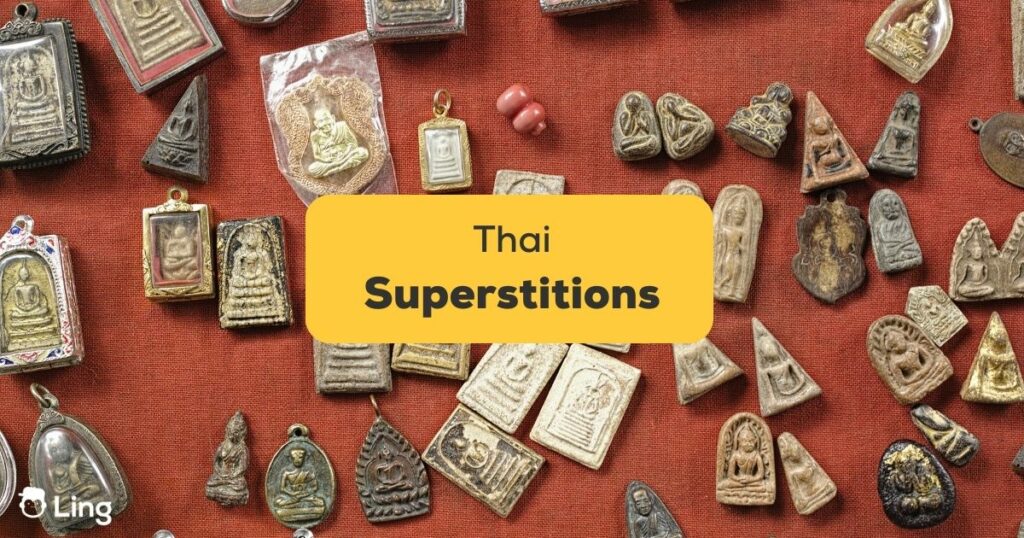As a traveler exploring the vibrant country of Thailand, it is fascinating to delve into the rich tapestry of cultural beliefs and practices that shape the everyday lives of the Thai people. One intriguing aspect of Thai culture is the prevalence of superstitions, which hold significant importance in various aspects of life. Understanding Thai superstitions can not only provide insight into local customs and traditions but also help travelers navigate social interactions and show respect for Thai culture.
In this article, we will explore an array of Thai superstitions that travelers should be aware of, offering a fascinating glimpse into the deep-rooted beliefs that shape the fabric of this enchanting country.
What Is “Superstitions” In Thai?
In the Thai language, “superstitions” resonate as “ความเชื่ออ迷信” (kwaam chêua mói sin), weaving themselves deeply into the rich cultural tapestry that forms daily Thai life, influencing facets from travel to personal relationships and business interactions. A respectful nod to the powerful unseen, these beliefs embody the seamless unity of the spiritual and physical worlds, an inherent part of the Thai worldview.
Embracing a rich mosaic of ancient folklore, animism, the guiding principles of Buddhism, and elements of Chinese mystical traditions, Thai superstitions stand as timeless whispers, passed down through generations and maintaining their essence in contemporary society. They act as guardians, beckoning good fortune, shielding against malevolent forces, and offering a protective embrace against adversities.
While embracing this aspect of Thai culture, it’s vital to recognize the diversity of beliefs, varying significantly across individuals and regions; not every Thai person subscribes to superstitious beliefs. However, acquainting oneself with this facet can open doors to respectful and enriching interactions, nurturing a positive cultural exchange. As we venture further, we’ll delve into an exploration of prevalent Thai superstitions, offering you a vibrant palette to paint your Thai adventure with empathy and understanding.
Popular Thai Superstitions
Spirit Houses (San Phra Phum)
There are many spirit houses on the grounds of homes and businesses since many Thai people believe in the existence of ghosts. The spirits that reside in these little homes are intended to receive refuge and offerings from humans in order to ensure luck and safety. Another popular myth is that if a pregnant woman attends a funeral, her unborn child will be haunted by the soul of a dead person.

Avoiding The Number 4
The homophone of the number four is similar to the Thai word for “death” (ความตาย or Khwām tāy), which makes it seen as unlucky in Thai culture. Buildings frequently skip the fourth level as a result, and people strive to avoid using license plates, phone numbers, or addresses that start with 4.
Lucky Colors
In Thai culture, colors have symbolic importance, and individuals frequently wear particular hues on particular days for luck or “โชค” (Chokh). For instance, many wear yellow on Mondays to remember the late ruler Rama IX because the color is linked with him.
Respecting Sacred Places
Thai people hold the view that particular locations, such as temples and shrines, are home to spirits and should be respected to the highest degree. When entering these regions, visitors should take off their shoes, dress modestly, and act silently.

Sai Sin Bracelets
The wearer of these holy white cords, which monks bless, is thought to be shielded from danger and evil spirits. During significant ceremonies and events, Sai Sin bracelets are frequently worn by attendees.
Offerings And Merit-Making
Offering food, cash, or other gifts to monks or temples is a common way for Thai people to make merit. This is thought to create good karma and guarantee a better future in this life as well as the next.
Buddhist Amulets (Phra Kring)
For protection and good fortune, these tiny amulets—which frequently include a little Buddha image—are worn as necklaces or left in cars. Many individuals think they have the power to both repel and bring good karma.
Takrut
Takrut are amulets with writing or prayers that are cylindrical or scroll-like. In order to ward against injury and bad fortune, they are worn as charms.
Avoiding Pointing With One’s Feet
Because the feet are seen as the lowest and dirtiest part of the body, pointing them at holy items, Buddha pictures, or other people is frowned upon.
Words Related To Thai Superstitions
Dive into the colorful fabric of their culture and discover words like “วิญญาณ” (spirit) and “ขอให้โชคดี” (good luck) that unravel the mysteries of their age-old beliefs. These words are like time capsules, connecting past and present, myth and reality. They’re your secret pass to blending seamlessly with the locals and seeing the world through their eyes.
| English | Thai | Pronunciation |
|---|---|---|
| Superstition | ไสยศาสตร์ | S̄ịyṣ̄ās̄tr̒ |
| Amulet | พระเครื่อง | Phra Khrueang |
| Spirit | วิญญาณ | Winyan |
| Ghost | ผี | Phi |
| Luck | โชค | Chok |
| Fate | โชคชะตา | Chok Chata |
| Talisman | ยันต์ | Yạnt̒ |
| Astrology | โหราศาสตร์ | Horasat |
| Fortune-teller | หมอดู | H̄mxdū |
| Omen | ลาง | Lāng |
| Sacrifice | เสียสละ | S̄eīys̄la |
| Taboo | ข้อห้าม | Kho Ham |
| Evil eye | ตาปีศาจ | Tā pīṣ̄āc |
| Blessing | พร | Phrom |
| Curse | คำสาป | Kham Sap |
| Shaman | หมอผี | Mo Phi |
| Ritual | พิธีกรรม | Phiti Krom |
| Offering | ถวาย | T̄hwāy |
| Sacred | ศักดิ์สิทธิ์ | Sak Sit |
| Amulet maker | ช่างทำพระเครื่อง | Chang Tam Phra Khrueang |
| Buddhist monks | พระสงฆ์ | Phra s̄ngḳh̒ |
| Soul mate | คู่จิตวิญญาณ | Khū̀ cit wiỵỵāṇ |
| Superstitious beliefs | ความเชื่อโชคลาง | Khwām cheụ̄̀x chokhlāng |
Learn Thai With Ling!
Did you know that Thai culture has a treasure trove of fascinating beliefs and superstitions? Interested to learn about the royal family in Thailand or more about Thai words related to beliefs? If you’re itching to dive into the world of Thai culture and language, look no further than the Ling app!
Ling offers a language learning adventure like no other, with lessons in over 60 foreign languages! What’s in store for you? Practical vocabulary that’ll make you a hit with the locals, fun mini-games to boost your memory, and brain-tingling quizzes to put your newfound knowledge to the test. The best part? You can become a language master by dedicating just 15 minutes a day to Ling!
Don’t wait around! Head over to the Apple App Store or Google Play Store right now, snag the Ling app, and kickstart your epic language learning journey today!




































































